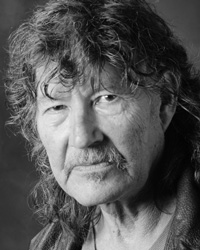An Urgency and a Hard-Won Authority
William Gay knew everything about the will—the iron will—and human longing, too—and how ferocious these can be inside of us, and how important they are to heed
When I first read William Gay’s writing in the pages of The Oxford American about ten years ago, it was like I’d won some kind of lottery. I mean this. It was like first reading Faulkner or O’Connor or Welty or Roth or Virginia Woolf, even. There was a wholeheartedness on the page—an urgency and a hard-won authority, like lemons in frothy water. And there was an outright courage, too—a plucky refusal to flinch. Even where you could hear the McCarthy and the Faulkner—just a little bit, just here and there—there was something other there, something fully warranted and actual, hilarious and heartbreaking. Whatever-it-was was dangerous, too, it seemed like, and a bit fatal.
Robert Frost says that sentence sounds “are gathered by the ear from the vernacular and brought into books,” and that “the most original writer only catches them fresh from talk, where they grow spontaneously.” I think this idea might be tied to the equally romantic idea of sentence-sounds being—somehow—a manifestation of character. Or let’s just say that certain writers—the very best—find a way of coupling their (best) selves to the various idioms they live among, only then and meanwhile to demonstrate the new amalgamation on paper, thereby making the inert and invisible wake up and sing.
 Such transformation happens, always, against great odds.
Such transformation happens, always, against great odds.
Always therefore it would be good, if you are a writer, to be obsessive, self-interested, and solitary-to-the-extreme—ferocious, over-confident, haughty, and rich, rich, rich, rich.
But what if you are the humble son of sharecroppers from Tennessee? What if you end up in Vietnam, rather than in pennyloafers at Yale? Or in some godforsaken submarine owned and operated by the U.S. Navy? What if you fall in love and have a bunch of kids? And write here and there, under the cover of darkness, in a kind of closet, just when you get a second, when you don’t have to chop wood or build a cabin or make a hundred dollars? What if after all of this and a goddamned divorce and heart sickness and I don’t know what-all, in terms of sorrows, you become, nevertheless, your best self?
What if years and years and years after this overtly unassuming beginning—out of your own audacity and hard work and sheer will—you finally find a way to manifest that keen sense of hilarity, observation, metaphor, music, image, wisdom, and story in the world?
Wouldn’t it just be the most wonderful thing?
After twelve months of begging and cajoling and sweet-talking, I met William Gay in person in September of 2010 when he finally agreed to come to Colby College to give a reading. Since he didn’t want to fly and didn’t drive, he got Sonny Brewer to bring him. It’s really a story for the annals, now: Sonny and William rolling through a torrential rain storm 2,000 miles from Southern Tennessee straight up through New York City to the woods of Maine to read for the very lucky students in the writing program at Colby.
You think the lesson is going to be direct and erudite—something about how to describe a landscape, say, without it seeming fake on the one hand or false on the other. But the lesson was much bigger than that for the students and my colleagues and me at Colby that day. It was about talent being something you can boil straight up through time like the little embers of an eventual exploding volcano. It was about the will—the iron will—and human longing, too—it was about how ferocious these can be inside of us, and how important they are to heed. It was about what might be done with a life no matter what and come what fucking may.
It was a blessing.
I write in a sad rush to thank William for that blessing—for the gift of himself he never gave up on—and to wish him straightforward ease wherever he is now, fishing off whatever sweet pier.
Adrian Blevins, a poet, is the author of The Brass Girl Brouhaha and Live from the Homesick Jamboree. She directs the creative-writing program at Colby College in Waterville in Waterville, Maine.

